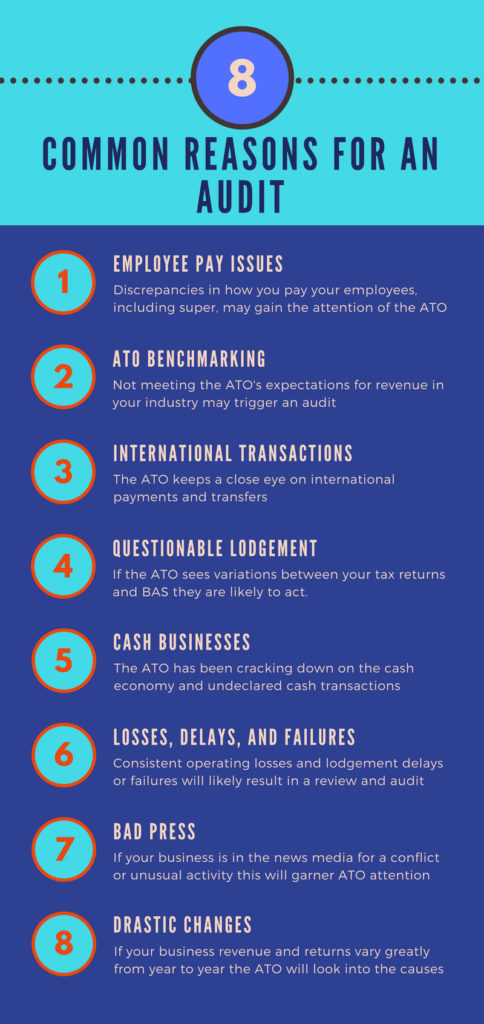No one wants their business interrupted by a tax audit. The threat of an ATO audit is enough to encourage many small business owners to stay compliant with their tax. But there are times when many small businesses struggle to be as sharp or as accurate with their tax returns as they would like. This is particularly the case when your business is starting out. As the years go by and your business practices improve, you may well feel that you are now on top of your taxes.
But a worry might yet niggle. What if errors in your tax returns from the past come back to haunt you? Could you be surprised by an audit now for a tax return submitted years ago? This guide seeks to give you clarity and perhaps peace of mind.
The first thing you need to consider when answering this question is your amendment period. The law limits how far back the ATO can go to amend their tax assessment of your tax activity. For most taxpayers with simple affairs, the tax office can go back two years, while if your tax affairs are more complex they can go back four years. Likewise, there is time after the submission of a tax return for both individuals and businesses to go back and change the information presented in that return. This means if you have a concern over your past tax activity potentially sparking a tax audit, you (and perhaps an outsourced CFO) can go back and correct your previous returns and win yourself peace of mind. From the day after the ATO gives you your notice of assessment, individuals and small businesses have 2 years to amend returns, while other taxpayers with more complex tax affairs have four years. Within the review period you can submit an amendment request more than once.
There are some exceptions to the limits on how far the ATO can go back. For specific taxes (such as those that relate to the R&D tax incentive and transfer pricing), you do not have the same scope for making changes to your returns. Likewise, if your return has come under any suspicion of tax fraud or evasion. Therefore, if you are worried that your past tax activity might come under the scrutiny of the ATO and potential tax audit penalties, the first step is to be aware of how far the tax office can go back and to take advantage of the amendment periods, but you also need consider whether your worries have arisen over taxes and suspicious activity that may allow the ATO to go further back than 2 or 4 years.
You are also far more open to the historical scrutiny of the ATO if you fail to lodge or knowingly lodge a false return. In such cases, there is no limit as to how far the ATO can go back. For example, if you did not lodge a return as far back 2000 then there is nothing preventing the ATO auditing your financials from that year, but you may struggle to have kept all the relevant documentation which might mitigate the impact of an audit. You are likewise exposed if you lodged returns that you knew were false, commonly because you wanted to report nil returns or a significantly lower income. 2 years, 4 years, 10 years, or more – if you failed to lodge or deliberately lodged falsely, the ATO can target you for a tax audit.
This raises the question of what kind of tax errors might be serious or suspicious enough so that they cannot be solved by simply amending a past return. Generally, there are number of reasons why the ATO might initiate a tax audit.

In particular relation to serious problems with past returns, the tax office mostly looks at questionable lodgement. Are there years when you failed to lodge a tax return for your business? Were their years when you lodged obviously inaccurate returns? You are also more likely to come under the scrutiny of the tax office for past errors when you run a cash business or use international entities. If you have in the past had a large amount of unreported cash earnings or if you have used overseas tax havens, then this type of suspicious activity is not likely to be fixed by simply trying to amend an old tax return, and the ATO can bring it up from any time in the past.
If you feel you have engaged in such suspicious activity in the past, or if the tax returns you are concerned about were submitted well beyond the amendment window, then you and your accountant or advisor need to prepare for any potential ATO scrutiny. If you are hit with an audit or not, it always benefits your business to be prepared by keeping accurate records. How far back do your records go? The ATO expects you to keep records for at least 5 years, 7 if you are a corporation. These should explain all your transactions clearly. This includes documentation such as invoices, bank statements, receipts, emails and other correspondence, and more. Since many small business owners who are worried about an erroneous tax return coming back to haunt them are also worried about keeping poor records in the past (the two often go hand in hand), then the key to preparing for a potential audit is organizing and interpreting the records you do have from the past. Your accountant or business advisor is best suited to make the most of whatever documentation you may have to explain your past activity. The ATO can subpoena all of your emails and all of your records, so hiding documentation rather than aiming to interpret and explain is not a smart option.
What penalties could you face if you are audited for past activity? During an audit, the ATO will assess between 20% and 100% of your past taxable income, based on how they view your past tax behaviour. The ATO looks at a number of criteria for this:
- How well can you demonstrate record keeping?
- To what extent have you obtained advice and relied on accountant?
- During an audit, were you cooperative, easy to reach, and give appropriate time and info to the ATO officers?
- What were the reasons for your past error? Were they inadvertent, reckless, negligent, or a deliberant scam?
- Who is at fault – the taxpayer or accountant? Often an accountant will point to you as the original source of the information that led to errors in the past submission of a tax return.
Key to all this is relying on an expert tax accountant or business advisor. This will help you determine whether your past errors fall into the 2-year or 4-year time frame that permits the ATO to raise them for an investigation, and if any past errors might be serious enough that the ATO can dig back as far as they please. An expert will also help you collate and interpret documentation so you put your best foot forward when facing a tax audit.
Calibre Business Advisory invests more time than most firms into finding solutions for our clients. Contact our business advisors and tax accountants to discover new options for your business in Australia and beyond.
Important Disclaimer: Readers should not act solely on the basis of the material on this page. Items herein are general comments only and do not constitute or convey advice. Legislation and proposals of legislation are also subject to constant change. We therefore recommend that formal advice be sought before acting in any of the areas. This news article is issued as a guide to the readers. Calibre Business Advisory Pty Ltd and its associated entities disclaims any losses that may be incurred as a result of the reader undertaking any action based on this article.

